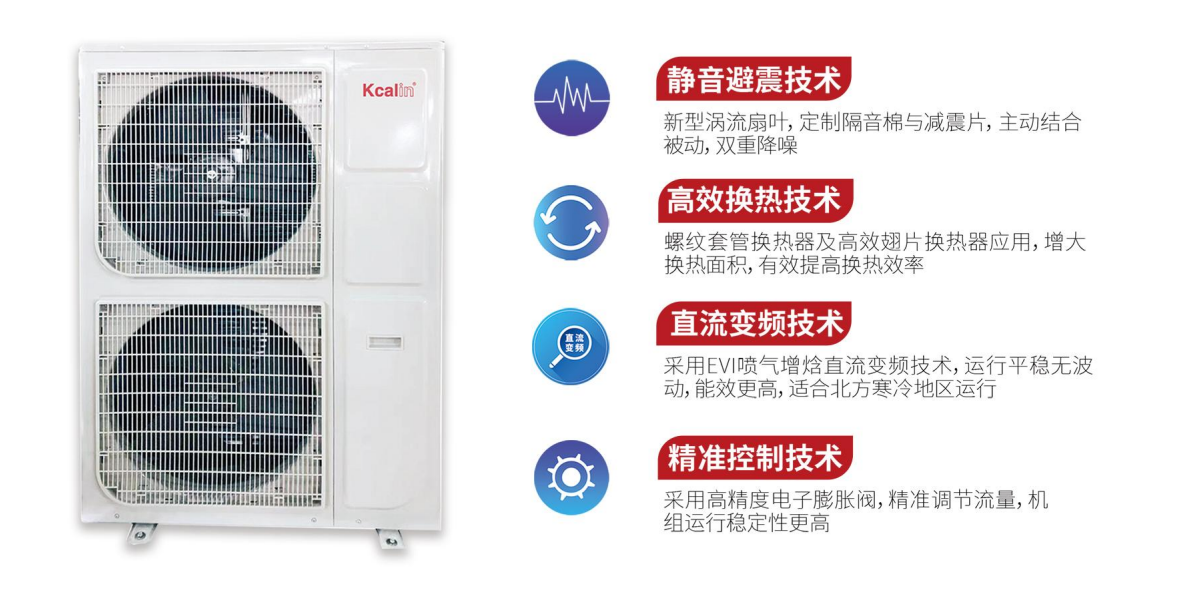Against the backdrop of energy scarcity and increasing awareness of environmental protection, finding efficient and environmentally friendly heating solutions has become an urgent need for many households and businesses. As an emerging heating equipment, air source heat pump water heaters have gradually gained market favor due to their advantages of high efficiency, energy saving, environmental protection, and safety.
Air source heat pump water heater is a device that utilizes low-grade thermal energy in the air and converts energy through heat pump technology to achieve heating. Its working principle is similar to a reverse air conditioning system, which uses a compressor to raise the absorbed air heat to a temperature suitable for heating, then transfers the heat energy to water through a heat exchanger, and distributes the heat to each room through a water circulation system.
Efficient and energy-saving performance

High COP: The COP of air source heat pump water heaters is usually between 3.0 and 5.0, which means that for every 1 kWh of electricity consumed, 3 to 5 times more heat energy can be generated. Compared to traditional electric heating equipment, its energy utilization efficiency is improved, which can effectively reduce users' heating costs.
Strong adaptability: Air source heat pump water heaters can operate stably in the ambient temperature range of -20 ℃ to 45 ℃, especially suitable for areas with cold winters. The development of modern heat pump technology has greatly improved its performance in low-temperature environments, ensuring efficient heating in cold climates.
Energy saving and environmental protection: Air source heat pump water heaters extract heat from the air without directly consuming fossil fuels, so they do not produce greenhouse gas emissions such as carbon dioxide during operation, making them environmentally friendly. Meanwhile, due to its efficient energy conversion efficiency, it reduces power consumption and further lowers its impact on the environment.
The advantages of safety and reliability
High safety: Compared with traditional heating equipment such as gas boilers, air source heat pump water heaters do not involve combustion processes, avoiding the risk of gas leaks and explosions. In addition, the water heating system does not produce harmful gases during operation, ensuring indoor air quality and household safety.
Stable operation: The air source heat pump water heater adopts excellent control technology, which can achieve precise temperature regulation and intelligent management, ensuring the stable operation of the system. Even in extremely cold weather conditions, it can provide continuous and stable heating services.
Long service life: The important components of air source heat pump water heaters, such as compressors and heat exchangers, are made of high-quality materials and excellent manufacturing processes, which have a long service life. Generally speaking, its service life can reach more than 15 years, far exceeding that of traditional heating equipment.
The advantages of multifunctional applications
Multi purpose: Air source heat pump water heater can not only be used for heating, but also provide domestic hot water, and even work in reverse to provide cooling in summer, achieving the function of one machine for multiple purposes. This multifunctional application not only improves the utilization rate of the device, but also saves users' investment costs.
High comfort: Air source heat pump water heaters provide heating through a water circulation system, with even heat distribution and no local overheating or overcooling like traditional radiators, providing a more comfortable indoor environment.
Air source heat pump water heaters, with their advantages of high efficiency, energy saving, safety, reliability, and multifunctional applications, are becoming increasingly popular heating equipment in households and enterprises. With the continuous advancement of technology and the popularization of the market, air source heat pump water heaters will play a more important role in the future heating field.







Comment